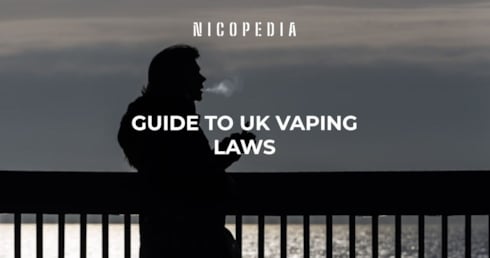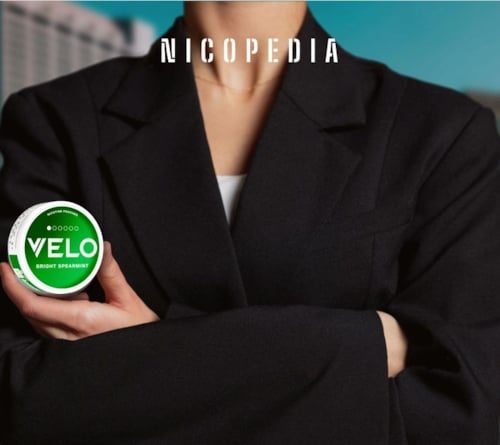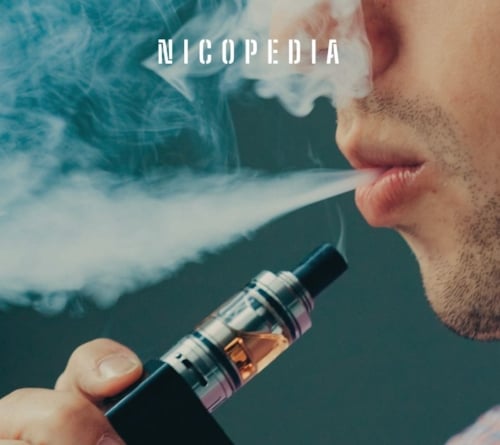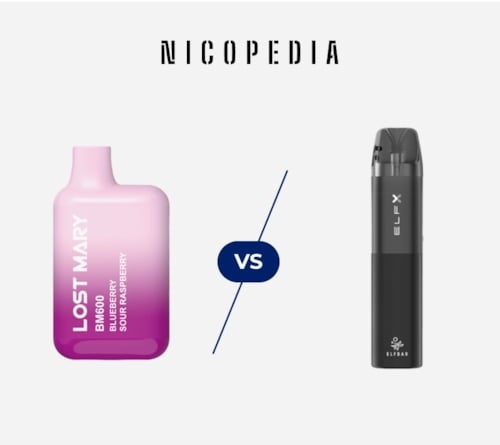Published 2024-05-28
Last update 2025-02-12
A Guide to UK Vaping Laws
Understanding UK vaping laws can help both consumers and retailers navigate a changing legal landscape. With vaping regulations evolving to protect public health, it's essential to know your rights and responsibilities, whether you're a vaper or a business. Below, we break down the key vaping laws in the UK, including where you can vape, product regulations, and how to spot illegal vapes.

The Basics: Overview of UK Vape Laws (2024)
The UK has some of the most comprehensive vaping regulations globally, balancing accessibility with safety. Here's a quick overview of the main rules around vapes in the UK:
- Age Restrictions: You must be 18 or older to purchase or use vapes in the UK. Retailers are required to verify the age of anyone buying vape products.
- E-Liquid Volume: Vape cartridges and tanks that contain nicotine cannot exceed 2ml of e-liquid capacity, and bottles of nicotine e liquid must not contain more than 10ml of liquid.
- Nicotine Strength: The maximum nicotine concentration in e-liquids is 20mg/ml (2%)
- Public Vaping Rules: Whether you can vape in public spaces is determined by property owners or local authorities. Many spaces include vaping in their “no smoking” policies.
- Labelling: Packaging must include health warnings, be child-resistant, and tamper-evident, as per the Tobacco and Related Products Regulations (TRPR).
Can You Vape in Public Places?
A frequent question among vapers is: "Can I vape in public?" The answer depends on the specific location. Here's a breakdown of rules in different venues:
Vaping in Restaurants, Coffee Shops, and Pubs
While there's no universal ban on vaping in hospitality settings, most major chains—such as McDonald's, Starbucks, and KFC—prohibit vaping indoors. However, some independent pubs and cafés may allow it. Always check with staff before vaping.
Vaping at Concerts and Events
Most large venues, such as Wembley Stadium and the NEC in Birmingham, do not allow vaping, as it is often incorporated into “no smoking” policies. Smaller venues may have different rules, so it’s best to confirm before attending.
Vaping at Sports Events
Major sports venues, including all Premier League grounds, have strict bans on vaping. Smaller stadiums may have more lenient policies, but checking with the venue is recommended.
Vaping in Hospitals
In Scotland, vaping is banned on hospital grounds (except NHS Lothian Trust). In England and Wales, policies vary by hospital, though most do not allow vaping indoors or on-site grounds.
Vaping on the Move
When vaping while travelling, the laws are slightly more complex and situation dependent.
Vaping While Driving
While it is legal to vape while driving, it can obscure your vision, posing a safety risk. Police can prosecute for driving without due care if they believe vaping has distracted you or caused poor visibility. Fines can reach up to £5,000, and you could face penalty points.Vaping on Public Transport
Most UK public transport systems, including trains, buses, and the London Underground, prohibit vaping for the comfort of other passengers. Some outdoor platforms may allow vaping, but it’s best to avoid it in “no smoking” zones.Vaping on Planes and in Airports
You can travel with vapes in your hand luggage, but you cannot use them on board. Airports often provide designated smoking or vaping areas before boarding.Vaping on Ferries and Cruises
Vaping is typically permitted in designated outdoor smoking areas on ferries and cruise ships. Smoking or vaping in cabins is usually prohibited.Vaping on Holiday
International laws on vaping vary widely. Countries like Thailand, Qatar, and India have outright bans, while others may restrict certain e-liquids or devices. Make sure you research local laws before travelling to avoid fines or confiscation.Vape Product Regulations
The Tobacco and Related Products Regulations (TRPR), introduced in 2017, govern the production and sale of vape products in the UK. Key rules include:
- E-Liquid Bottles: Maximum volume of 10ml per bottle
- Tank Size: Tanks must hold no more than 2ml of e-liquid.
- Nicotine Limits: E-liquids must not exceed 20mg/ml (2%) nicotine strength
- Ingredient Restrictions: Substances like caffeine, taurine, and colourings are prohibited in vape products.
- Labelling and Packaging: Products must have health warnings and comply with child-resistant standards.
- Pre-Market Notification: Manufacturers must notify the Medicines and Healthcare Products Regulatory Agency (MHRA) about new products before selling them.
How to Spot Illegal Vapes
Illegal vapes have surged in the UK market, often exceeding legal nicotine or e-liquid limits. Here's how to identify them:
- Nicotine Strength: Check the label - any device containing over 2% nicotine is illegal.
- E-Liquid Capacity: Disposable vapes must not exceed 2ml (approx. 600 puffs). Devices claiming more are likely illegal or fake.
- Packaging Quality: Legitimate vapes have child-resistant and tamper-evident packaging, while counterfeit products may not.
- Pricing: If the price seems too good to be true, it probably is. Cheap knock-offs are often illegal and unsafe.
- Health warnings: Vapes that contain nicotine must contain a health warning, if the product does not, it may be illegal.
Why Are Illegal Vapes Dangerous?
Illegal vapes bypass safety regulations, meaning they may contain harmful substances or unsafe levels of nicotine. Without proper oversight, the materials and production processes used can pose health risks to consumers. Always purchase from reputable UK retailers to ensure your product complies with regulations.
New Vaping Laws UK: What is Changing in 2024-2025?
The UK Government is introducing significant updates to vaping laws aimed at addressing concerns about youth vaping and the environmental impact of disposable vapes. These updates include stricter regulations targeting the marketing, sale, and availability of vaping products. Below, we explore the key changes expected in 2024 and 2025:
Ban on Disposable Vapes
One of the most impactful measures is the planned ban on disposable vapes, including both nicotine and non-nicotine products. This decision is driven by the sharp increase in youth vaping, with studies showing that 9% of 11 to 15-year-olds and 7.6% of 11 to 17-year-olds now vape regularly or occasionally. Flavoured disposable vapes, often designed to appeal to children with themes such as “bubblegum” or “energy drink,” have contributed significantly to this rise. Beyond health concerns, disposable vapes are a major environmental issue, with 5 million devices discarded weekly, creating vast amounts of hard-to-recycle electronic waste.
Tighter Marketing Restrictions
New laws will restrict how vapes are marketed to prevent appealing to younger audiences. This includes a ban on colourful or child-friendly packaging and the removal of vapes from prominent displays in shops. Retailers will also face stricter penalties for selling to underage customers, including £200 on-the-spot fines and potential fines of up to £2,500 for persistent violations. There will also be a new licensing system for shops selling vapes in the UK.
While there is not yet any ban in place on packaging or displays of vapes, the introduction of the new vape laws will bring power to ban certain packaging and displays in the future.
“Smoke-free Generation” Legislation
The UK Government is also working toward creating the first "smoke-free generation." Under this policy, children born after a specific year (currently suggested as 2009) will be prohibited from ever purchasing tobacco products. This aims to phase out smoking entirely over time while also complementing vaping restrictions to ensure these tools are used solely for smoking cessation, not as a gateway for non-smokers.
Environmental and Health Impact Focus
In addition to public health concerns, the new laws highlight environmental issues, emphasizing the unsustainability of disposable vapes. These laws aim to reduce waste and bolster recycling efforts, ensuring that vaping products align better with environmental goals.
UK vaping laws are designed to balance consumer freedom with safety and public health. Whether you're a vaper or a retailer, understanding these regulations is essential to ensure compliance and a safe vaping experience. With more updates to vaping laws on the horizon, staying informed is key. Always buy your products from reputable UK retailers and dispose of used devices responsibly.
For the latest updates on UK vaping regulations, visit the UK Government's Official Website or consult the NHS website for health-related guidance.
Who can buy vapes?
Who can buy vapes?
In the UK, it is against the law to sell nicotine vaping products to anyone under 18 years old, or for adults to buy them on their behalf.
Are vapes going to be banned?
Disposable vapes will be banned on 1st April, 2025. The Tobacco and Vapes Bill, backed by the Conservative and Labour parties, is expected to be passed into law towards the end of 2024 and implemented by early 2025 while rechargeable and refillable vapes will still be available. Not sure what these are? Check out our guide on refillable disposable vapes.
Why are disposable vapes being banned?
The UK government has cited two key reasons for the ban. Firstly, given the huge impact they have on the environment as disposable vapes are not recycled properly, leading to 1.3 million single-use vapes being binned every week. Banning disposables will also hopefully prevent young people from accessing them.
Are vapes included in the new ‘smoke-free generation’ legislation?
Products such as vapes and nicotine replacement therapies are out of scope for the smoke-free generation proposal, because they do not contain tobacco and are often used as a quit aid for those who smoke.
What vapes will be legal following the ban?
It is only disposable vapes that will be banned. Adult vapers will still be able to access refillable and reusable vapes.
Are ‘illegal vapes’ real?
Before the disposable vape ban comes into play, there are still some disposable vapes currently on sale that are illegal and do not meet UK safety regulations. They can contain high levels of harmful substances and can be spotted using the below guide:
- Eliquid bottles cannot contain more than 10ml of eliquid
- Vape tanks cannot have a capacity of more than 2ml
- All packaging must contain nicotine warnings and be child-resistant
- Colourings, taurine and caffeine among other items are banned ingredients in vapes
- E-liquids must not have a nicotine strength of more than 2% (20mg/ml)
What makes a vape illegal?
Before the disposable vape ban comes into play, there are still some disposable vapes currently on sale that do not meet UK safety regulations. These are considered illegal since they could potentially contain high levels of harmful substances and can be spotted using the following guide:
- E-liquid bottles cannot contain more than 10ml;
- Vape tanks cannot have a capacity of more than 2ml;
- All packaging must contain prominent nicotine warnings and be child-resistant;
- Colourings, taurine and caffeine among other items are banned ingredients in vapes;
- E-liquids must not have a nicotine strength of more than 2% (20mg/ml).
Related articles




